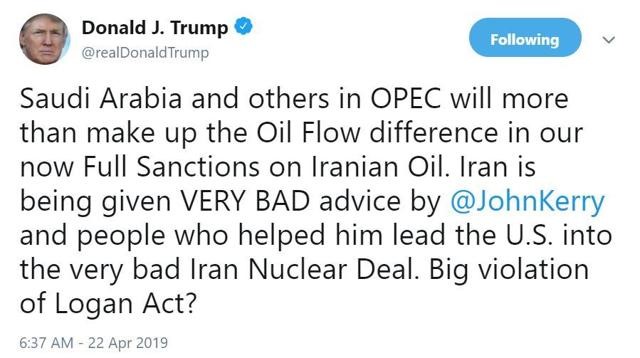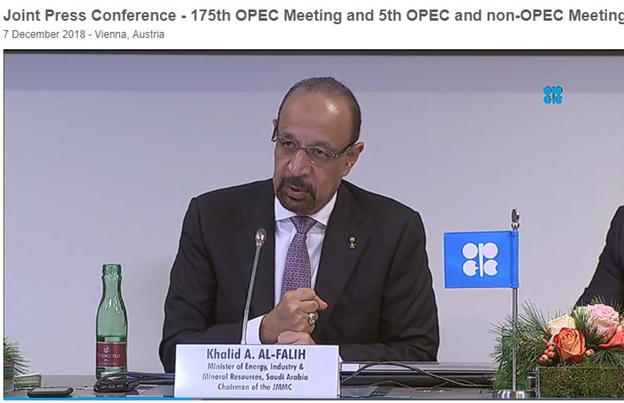Crude oil production in Iran had reached 3.84 million barrels per day (mmbd) in the period following the lifting of sanctions by the Obama Administration. But following President Trump’s announcement in May 2018 that the U.S. would re-impose sanctions in November, demand for Iranian crude dropped to 3.7 mmbd by October. In November, the Trump Administration allowed limited waivers to the sanctions to eight countries, but Iranian production dropped by another 700,000 b/d by March.
The waivers were designed to terminate on May 2nd, but Secretary of State Mike Pompeo announced April 22nd that the waivers would not be extended. "This decision is intended to bring Iran's oil exports to zero, denying the regime its principal source of revenue," the White House said in a statement.
According to the International Energy Agency (IEA), Iran’s exports of crude and condensates are running about 1.1 mmbd in April. President Trump tweeted Saudi Arabia and others in OPEC had assured him that they would make up the impact of any decline in Iran’s exports:

In the months leading up to last November, KSA had increased its output to 11.1 mmbd, at the request of the White House, to ensure that oil supplies would be adequate once the Iranian sanctions took effect in November. But Trump’s granting of the waivers immediately created an oversupply in the global oil market, and oil prices collapsed as a result.
Saudi Arabia subsequently reduced its production to 9.8 mmbd as of March, a 1.3 mmbd drop in an effort to rebalance the market. The IEA notes that “global spare production capacity has risen to 3.3 mb/d, with 2.2 mb/d held by Saudi Arabia and around 1 mb/d by the United Arab Emirates, Iraq, and Kuwait.” It also estimates that OECD oil inventories at the end of February were 2.871 billion barrels, higher than the 5-year average.
The White House said in a statement on April 23 that “The United States, Saudi Arabia, and the United Arab Emirates, the three largest energy producers in the world, together with our friends and allies, are committed to ensuring the world’s oil markets receive all supplies, including the deficit created by the non-use of Iranian oil.”
Saudi Arabia’s energy minister, Khalid Al-Falih, said that KSA will not significantly increase May’s production. “We will see what the customers want. I think our intent is to remain within our voluntary production limit, but at the same time to be responsive to our customers, especially those who have been under waivers, and those waivers have been withdrawn.”
He added that Saudi oil shipments for June will be allocated early in May. “We think there will be an uptick in real demand, but certainly we’re not going to be preemptive and increase production preemptively because the market is well-supplied and inventories continue to rise.”
Conclusions
Iran is Saudi Arabia’s arch-nemesis, and so it will cooperate with the U.S. squeezing Iran further. In addition, the U.S. is KSA’s primary ally, and its defense depends on the U.S. Furthermore, Mr. Al-Falih stated at the end of December’s OPEC meeting “Our guiding principle is we will keep the market well-supplied.”

Source: OPEC
On the other hand, KSA does not want to repeat its increase in production on a preemptive basis, which ended up causing a short-term oversupply and price collapse. And so May is unlikely to unfold as last November did, with KSA’s production way ahead of demand, counting the waivers.
On the other hand, oil prices are already high, and there could be another surge as the tighter sanctions go into effect. In that case, a clear opportunity to short the market may develop because KSA and the UAE will increase production quickly, if necessary, to meet demand.
Another trading opportunity in development is the June OPEC meeting. If the sanctions waivers are terminated, OPEC will be in the difficult position of lifting its output limits, which is a delicate matter, prone to mistakes.
Check back to see my next post!
Best,
Robert Boslego
INO.com Contributor - Energies
Disclosure: This contributor does not own any stocks mentioned in this article. This article is the opinion of the contributor themselves. The above is a matter of opinion provided for general information purposes only and is not intended as investment advice. This contributor is not receiving compensation (other than from INO.com) for their opinion.
